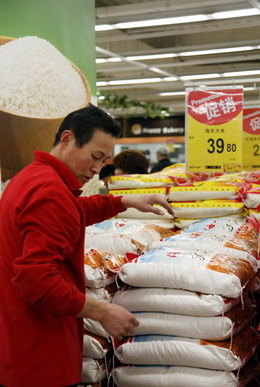August CPI likely to show slower rate of inflation
Updated: 2011-09-06 09:04
By Chen Jia (China Daily)
|
|||||||||||
BEIJING - China's consumer prices were expected to increase at the slower pace of about 6 percent in August, driven down by stabilized food prices, economists said.
 |
|
A clerk stacks bags of rice at a supermarket in Shanghai. According to economists, China's consumer price index is expected to have fallen to about 6 percent in August. [Photo/Agencies] |
The consumer price index (CPI), a main gauge of inflation, is likely to have fallen to about 6 percent in August compared with a year earlier, because pork prices remained relatively stable, Wang Guogang, head of the institute of finance and banking at the Chinese Academy of Social Sciences (CASS), told China Daily.
"The number could fall even more in the fourth quarter of this year," he said.
Soaring food prices, which accounted for about 30 percent of the basket of goods used to calculate the inflation rate, was the main cause of the higher CPI figure this year, Wang said.
Peng Wensheng, the chief economist at China International Capital Corp Ltd, made the same prediction for the August CPI figure, falling from a 37-month high in July, as indicated by the falling food prices released by the National Bureau of Statistics (NBS) and the Ministry of Commerce.
Driven mainly by fast-growing food prices, which increased by 14.8 percent year-on-year, the CPI reached 6.5 percent in July, according to the NBS. The statistics bureau will release the August CPI figure on Sept 9.
According to Jing Ulrich, managing director and chairman of global markets in China at JPMorgan Chase & Co, China's inflation is likely to gradually decrease from August thanks to the constantly tightening monetary policy, which has included three interest rate hikes and six of the reserve requirement ratio for commercial banks in 2011.
"However, in the long term, the inflationary pressure may not ease because of the increasing labor cost and excessive market liquidity," said Ulrich.
Wang Tao, a Hong Kong-based economist for UBS AG, wrote in a research note that the macro policy is likely to change only if exports slowed sharply or industrial production and investment growth faltered.
"Besides, the fiscal policy is expected to take the lead in future policy easing, likely directing more funds to social housing, water systems and irrigation projects," said Wang.
In order to control food prices, Wang Guogang from the CASS suggested taking administrative measures to limit speculative activities that drive up food prices. In addition, the government should increase fiscal subsidies for farmers and reduce their taxes. "Monetary policy is not the only tool to tame inflation," he said.
Related Stories
CPI to be no higher than 6% in Aug: Brokerages 2011-09-02 16:33
CPI to fall and rate hike unlikely 2011-09-01 18:06
Price regulation top priority: Premier Wen 2011-08-31 16:34
Pork price rises hit fall custom 2011-08-09 14:40
- China's ODI up 21.7% to $68.81b in 2010
- Baidu, Dell team up for tablets and mobiles
- Import prices of iron ore climb last week
- Firmer RMB helps curb inflation: Zoellick
- Coca-Cola to spur per capita sales in China
- Production shut down in Bohai
- China Vanke sales fall 12.6% in Aug
- Rare earth mines in E China to halt output













